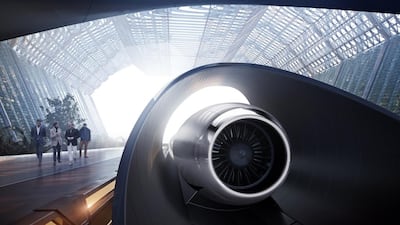Hyperloop Transportation Technologies (HTT) has begun construction, in Toulouse France, of the world’s first full-scale passenger hyperloop capsule. HTT’s capsule will have a top speed of 1,223 kilometres per hour, be 30 metres long, with a passenger capacity of up to 40 people. It is expected to be completed in early 2018. Negotiations are continuing as to where it may make its inaugural journey.
“We are building the world’s first full scale passenger hyperloop capsule,” said Dirk Ahlborn, HTT’s chief executive. “We are taking a passenger-first approach to guarantee that safety is always our number one concern. It has been crucial in our development to go past the simple requirements of freight in order to build a better and safer system for everyone.”
HTT has an agreement with Lawrence Livermore National Laboratory for use of their passive magnetic levitation system.
The use of Hyperloop for mass transit was first considered by billionaire inventor Elon Musk in 2013 based on the idea of pods travelling through a sealed tube powered by magnetic propulsion in a low pressure environment and the electricity needed generated from solar energy. Mr Musk open sourced his idea so others may make the concept a reality.
Hyperloop One, a competitor to HTT and closely associated with Mr Musk, is carrying out a feasibility study with Dubai’s Roads and Transport Authority (RTA) and is currently building a prototype of the Hyperloop system north of Las Vegas in the Nevada desert. The marketing for the projects suggests it could cut the Abu Dhabi-Dubai commute to just 12 minutes and Dubai-Jeddah would take just over an hour.
The likelihood of the Hyperloop becoming a reality in the region, however, relies on collaborative will.
“The Hyperloop, apart from being untried, untested and probably very expensive, needs to be region-wide for any purpose. The likelihood of the negotiations between the region’s countries, were there are always winners and losers, happening in a smooth and timely fashion is unlikely,” said Matt Green, the head of research and consulting at CBRE.
“I think there are many more priorities at a country and regional level than the Hyperloop.”
ascott@thenational.ae
Follow The National's Business section on Twitter


